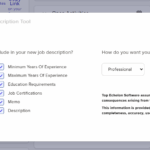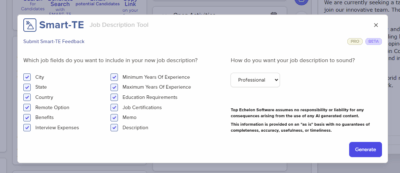Since its implementation in May 2018, the General Data Protection Regulation (GDPR) has transformed the way businesses across the European Union handle personal data. For recruiters, especially those working within or with companies in the EU, GDPR compliance is not optional—it’s a legal necessity. The regulation introduces stringent requirements for data collection, storage, processing, and sharing, all of which are daily activities in recruitment.
Recruiting agencies and search consultants are constantly handling personal data, such as candidate resumes, contact information, and job application histories. While recruiting software provides a streamlined way to manage and process this data, it also adds a layer of complexity when it comes to GDPR compliance. If recruiters aren’t careful, they can inadvertently breach GDPR rules, risking hefty fines, legal consequences, and reputational damage.
In this article from Top Echelon Recruiting Software, we’ll explore the impact of GDPR on recruitment processes, outline the essential steps for ensuring compliance with recruiting software, and provide actionable insights on how to protect both your agency and your candidates from potential GDPR violations.
Understanding GDPR in the Context of Recruitment
GDPR is a regulation designed to protect the personal data of individuals within the EU. It applies to any company that processes the personal data of EU residents, regardless of where the company itself is based. Given that recruiters regularly collect, store, and use personal data from candidates, clients, and other stakeholders, compliance with GDPR is essential.
The regulation sets out specific principles that govern the processing of personal data, including:
- Lawfulness, fairness, and transparency: Data must be processed lawfully and fairly, with transparency around how it is being used.
- Purpose limitation: Data must be collected for specified, explicit, and legitimate purposes, and not further processed in a way incompatible with those purposes.
- Data minimization: Only the data necessary for the intended purpose should be collected and processed.
- Accuracy: Personal data must be accurate and kept up to date.
- Storage limitation: Data should not be stored for longer than is necessary for the purpose for which it is being processed.
- Integrity and confidentiality: Data must be processed securely, ensuring its confidentiality and integrity.
Recruiters must comply with these principles when handling personal data, ensuring that they have legal grounds for processing the data, maintaining transparency with candidates, and safeguarding the data from unauthorized access.
GDPR Compliance Challenges in Recruitment
Recruiting agencies face several unique challenges when it comes to GDPR compliance. Some of the most common include:
- Collecting explicit consent: Under GDPR, recruiters must obtain explicit consent from candidates before collecting or processing their personal data. This includes storing resumes, sharing information with clients, and using candidate data for future job openings. Consent must be freely given, specific, informed, and unambiguous.
- Right to be forgotten: Candidates have the right to request that their personal data be deleted from a recruiter’s database. This can be challenging for recruiters who rely on building long-term relationships with candidates and keeping their information on file for future opportunities.
- Data minimization: Recruiters must ensure they only collect the information necessary for the recruitment process. Collecting excessive data or using it for purposes outside of the candidate’s consent can lead to GDPR violations.
- Data sharing with third parties: Recruiting often involves sharing candidate data with clients, background check companies, or other third-party services. Recruiters must ensure that any third party they share data with is also GDPR compliant and has appropriate safeguards in place.
- Data security: GDPR places a strong emphasis on securing personal data to prevent breaches. This means recruiters must take appropriate measures to protect the data they collect and store, including using encrypted recruiting software and ensuring that only authorized personnel have access to sensitive information.
How Recruiting Software Can Help with GDPR Compliance
The right recruiting software can play a critical role in helping recruiters manage GDPR compliance more efficiently. By leveraging software that is designed with GDPR in mind, recruiters can automate many compliance-related tasks, reduce the risk of human error, and ensure that they meet the requirements of the regulation.
Here are some key ways that recruiting software can help with GDPR compliance:
1. Automating Consent Management
One of the most critical aspects of GDPR compliance in recruitment is obtaining and managing candidate consent. Before recruiters can process candidate data, they need explicit consent to do so. This consent must be documented and easily retrievable in case of an audit.
Recruiting software simplifies this process by automating consent management. Most GDPR-compliant platforms include features that allow recruiters to:
- Request consent: When a candidate applies for a job or submits their resume, the software can automatically generate a consent request. The candidate must explicitly agree to have their data collected and processed before their information can be stored in the system.
- Track and store consent records: Recruiting software keeps detailed records of when and how consent was obtained. This information is stored in a centralized system, making it easy for recruiters to retrieve it if needed for an audit or to demonstrate compliance.
- Manage consent for different purposes: GDPR requires that consent be specific to the purpose for which the data is being collected. If a recruiter wants to use candidate data for a new purpose (e.g., marketing or future job openings), they need to request additional consent. GDPR-compliant recruiting software can handle multiple layers of consent, ensuring that candidates are fully informed about how their data will be used.
By automating consent management, recruiting software reduces the administrative burden on recruiters while ensuring that they meet the requirements of the GDPR.
2. Enabling Candidate Rights
Under GDPR, candidates have several rights related to the processing of their personal data, including the right to access their data, correct any inaccuracies, and request its deletion. Recruiting software can help agencies manage these rights efficiently.
- Right to Access: Candidates have the right to request access to the personal data that a recruiter holds about them. GDPR-compliant recruiting software provides tools that allow candidates to view or download their data through self-service portals. This reduces the manual workload for recruiters while ensuring compliance with the candidate’s right to access.
- Right to Rectification: Candidates also have the right to correct any inaccurate or incomplete data held about them. Recruiting software can enable candidates to update their information directly within the system, ensuring that the data remains accurate and up-to-date.
- Right to Erasure (Right to be Forgotten): Candidates can request that their personal data be deleted from a recruiter’s database if it is no longer necessary for the purpose for which it was collected. GDPR-compliant recruiting software provides a straightforward way for candidates to request data deletion, and it automates the process of removing their data from the system.
By enabling these candidate rights through self-service tools and automated workflows, recruiting software ensures that agencies remain compliant with GDPR while reducing the administrative burden on recruiters.
3. Data Minimization and Purpose Limitation
GDPR requires that recruiters collect only the data that is necessary for the recruitment process and use it solely for the purpose for which it was collected. Recruiting software helps ensure compliance with these principles by:
- Customizable Data Fields: GDPR-compliant recruiting platforms allow recruiters to customize the data fields they collect based on the specific needs of the recruitment process. This ensures that recruiters only collect relevant information and avoid unnecessary data collection that could lead to non-compliance.
- Data Retention Policies: GDPR limits how long personal data can be stored. Recruiting software allows recruiters to set automated data retention policies, ensuring that candidate data is deleted after a specified period if it is no longer needed for recruitment purposes. This helps agencies avoid the risk of storing personal data for longer than is legally allowed.
- Purpose-Specific Processing: If a recruiter wants to use candidate data for purposes other than recruitment (e.g., marketing, newsletters, or future job opportunities), they must obtain explicit consent for each purpose. Recruiting software can track and manage these consents, ensuring that data is processed only for the specific purposes that the candidate has agreed to.
By ensuring data minimization and purpose limitation, recruiting software helps agencies stay within the boundaries of GDPR while optimizing the recruitment process.
4. Data Security and Access Control
Data security is a central tenet of GDPR. Recruiting agencies handle a significant amount of sensitive personal data, including contact information, employment history, and sometimes even financial or medical information. GDPR requires that this data be protected from unauthorized access, loss, or breach.
Recruiting software helps ensure data security in several ways:
- Role-Based Access Control (RBAC): GDPR requires that only authorized personnel have access to personal data. Recruiting software allows agencies to implement role-based access control, ensuring that only users with the appropriate permissions can view or edit sensitive data. For example, junior recruiters may only have access to basic candidate profiles, while senior staff can access more detailed information.
- Data Encryption: To protect personal data from unauthorized access, GDPR requires that it be stored securely. Many recruiting software platforms use data encryption to safeguard candidate information both at rest and in transit. This ensures that even if the data is intercepted or accessed without permission, it remains unreadable.
- Audit Logs: GDPR-compliant recruiting software often includes audit logs that track all user activity within the system. This allows agencies to monitor who accessed candidate data, when it was accessed, and what changes were made. In the event of a breach or an audit, these logs can provide crucial evidence of compliance.
- Data Breach Notifications: GDPR requires that data breaches be reported to authorities within 72 hours. Many recruiting software platforms include data breach notification features, which automatically alert recruiters if a breach is detected, allowing them to take immediate action.
By providing robust security features and access controls, recruiting software helps agencies protect candidate data and ensure compliance with GDPR’s security requirements.
5. Third-Party Data Sharing and Vendor Compliance
Recruiting agencies often work with third-party vendors, such as background check providers, payroll services, or job boards, to process candidate data. Under GDPR, recruiters are responsible for ensuring that any third party they share data with is also GDPR compliant.
Recruiting software can simplify this process by:
- Managing Data Processing Agreements: When sharing data with third-party vendors, GDPR requires that agencies have a data processing agreement (DPA) in place. Many recruiting software platforms include features that help agencies manage these agreements, ensuring that all third parties are contractually obligated to comply with GDPR.
- Tracking Data Transfers: Recruiting software can track when and where candidate data is shared with third parties. This provides transparency and ensures that data sharing is done in accordance with GDPR requirements.
- Vendor Risk Assessments: Some recruiting software platforms offer built-in tools for conducting vendor risk assessments. These assessments help agencies evaluate whether a third-party vendor has appropriate safeguards in place to protect candidate data and comply with GDPR.
By managing third-party data sharing and ensuring vendor compliance, recruiting software reduces the risk of GDPR violations and helps agencies maintain control over how candidate data is used.
Best Practices for Using Recruiting Software to Ensure GDPR Compliance
To make the most of your recruiting software in terms of GDPR compliance, it’s essential to follow best practices. Here are some key strategies to keep in mind:
- Choose GDPR-Compliant Software: Not all recruiting software is designed with GDPR in mind. When selecting a platform, ensure that it meets the requirements of GDPR, including consent management, data minimization, and security features. Look for vendors that offer built-in compliance tools and have a proven track record of working with EU-based clients.
- Regularly Review Data Retention Policies: GDPR requires that personal data be deleted when it is no longer necessary for the purpose for which it was collected. Use your recruiting software to set automated data retention policies, and review these policies regularly to ensure they are aligned with GDPR requirements.
- Train Your Team: Even with the best software, compliance ultimately depends on how your team uses it. Ensure that all recruiters and staff members are trained on GDPR principles and how to use the software in a compliant manner. This includes understanding consent requirements, managing data subject requests, and securing candidate data.
- Conduct Regular Audits: Regular audits of your data processing activities can help you identify any potential compliance issues. Use the reporting and audit log features of your recruiting software to monitor data access, review consents, and ensure that all data processing activities are properly documented.
- Maintain Transparency with Candidates: GDPR emphasizes transparency, so it’s important to keep candidates informed about how their data will be used. Use your recruiting software’s consent management and communication tools to provide candidates with clear information about data processing activities and to ensure that they can easily access or delete their data if requested.
Conclusion
GDPR compliance is an essential consideration for any recruiting agency or search consultant working with candidates in the European Union. The regulation’s strict requirements for data collection, processing, and security mean that recruiters must be diligent in how they handle candidate data. Fortunately, the right recruiting software can make GDPR compliance much easier to manage.
By automating consent management, enabling candidate rights, minimizing data collection, securing personal data, and ensuring vendor compliance, recruiting software helps agencies navigate the complexities of GDPR while maintaining a streamlined and efficient recruitment process.
For recruiters, staying compliant with GDPR not only helps avoid legal penalties but also builds trust with candidates and clients, demonstrating a commitment to data privacy and ethical recruitment practices. As data protection regulations continue to evolve, investing in GDPR-compliant recruiting software is not just a legal requirement—it’s a smart business decision that will set your agency up for long-term success.








